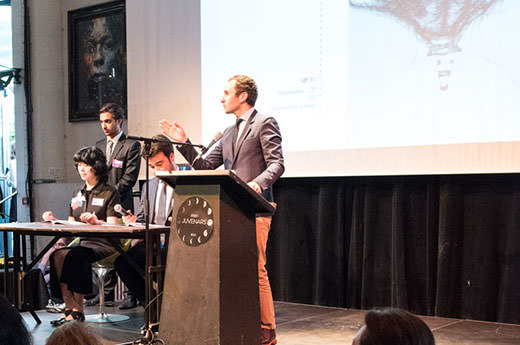
If you are considering launching your career in arts management, becoming an auctioneer is one possible path. A fine art auctioneer organizes and hosts auctions. He or she acts as a referee between buyers and sellers who makes it possible for them to come up with a price they both agree is fair. This profession allows you to have finger on the pulse of the art world, as you organize transactions. Famous auctioneer such as Simon de Pury play a major role in shaping the art market, and witness history by making possible the sales of major art pieces.
Job responsibilities
Conducting the auction
The position entails the following responsibilities:
- Hosting the auction
- Presenting the items for sale
- Keeping tracks of the bids expressed by the attendees
- Concluding the sale by striking a gavel, when he or she deems the highest bid is reached
Before an auction starts, the estimated market price of the item is announced. Whenever a seller requires a reserve price, the auctioneer upholds this wish by starting the opening bid at this amount of money.
Aside from these obvious duties, the job includes other responsibilities such as:
Appraising works of art
This duty consists in .identifying any critical information about a piece, such as its origin, its production date, its creator, any defect it may have, etc. With this information, one can then properly assess the work of art’s value on the market, and set a starting price. In certain cases, the help of art experts and appraisers is required.
Overseeing cataloguing
Based on the demands or requests from potential buyers, one updates the catalogue referencing all the works of art for sale.
Marketing and networking
The job also entails contacting potential buyers as well as networking with art appraisers and collectors to find business opportunities.Therefore having a background in marketing is always a plus.
Skills and Qualifications
Excellent public speaking and presentation
You are the face of the auction house your work for. With that in mind, you should be impeccable in your presentation of self as it will reflect on your establishment. This also means dressing the part.
Speaking relatively fast while maintaining a clear pronunciation is also essential, as quick pace is known to stimulate the public and keep it engaged.
Remaining calm under pressure
The atmosphere in the room can get agitated. You must be able to keep a clear mind and not lose the count, while still being comfortable in front of a crowd.
Show enthusiasm for the sale
This goes without saying, you must be passionate about arts and arts collecting. As Hugh Edmeades puts it : "Auctioneers must enjoy themselves, and the bidders will too".
An in-depth knowledge of art
Being knowledgable in art in general, the art market and art history is paramount. Those 3 aspects are fundamental, because you'll need to perfectly know the items for sale and their current worth on the market.
Also, needless to say that being able to spot counterfeits comes in handy.
How to become an art auctioneer?
To pursue this occupation, there are multiple possible paths to follow.
But, before even considering pursuing this career, you may want to attend a few auctions to see if this line of work is really for you.
Education
To build your knowledge of art and its market, we suggest you take a master’s degree or mba in art sales. One should also read articles specializing in auction and the art market to stay informed of its current trends. Sotheby’s Magazine and La Gazette Drouot are good examples.
One of the key to make it in this profession is specialization, so becoming an expert in one particular type of art can be a way to achieve that.
As this is a profession partly learned on the job, you’ll have to get experience through internships in Auction houses. Once you've graduated, you also have the opportunity to become an apprentice.
Getting a license
The rules and requirements to fulfill to become an art auctioneer greatly vary from countries to countries. In the US for instance, you’ll have to take an exam and apply for a license. Each state has its own sets of requirements. So If you live in the US, the best thing to do first is to reach out to your local professional organization or the National Auctioneer Association to know more.
Salary
The average salary greatly varies from one country to the next. However, If you wish to pursue this career, one thing to know for sure is that you’ll earn part of your incomes from commissions, which usually amount to 10% to 15% of the prices items were auctioned for.
More art job descriptions:
Artistic director job description


 Download application form
Download application form